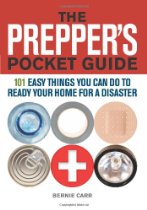This post is by Bernie Carr, apartmentprepper.com
Everyone saw the news report about visitors at Yosemite National park who stayed at tent-style “signature” cabins in Curry Village becoming exposed to the Hantavirus. Hantavirus causes Hantavirus Pulmonary Syndrome (HPS) which attacks the lungs and can be fatal. The disease is carried in the urine, saliva or feces of deer mice and other rodents. In this particular case, the rodents nested in between the double walls of the cabins, and thus unknowing visitors were exposed to the disease. As of this writing, the CDC states approximately 10,000 visitors who stayed in the cabins from June through August 2012 have been exposed to the disease.
How do you Catch Hantavirus Pulmonary Syndrome (HPS)?
HPS is caught by people who breath air that has been contaminated by the hantavirus. The virus is carried by deer mice, cotton rats and rice rats (southeastern states) or the white-footed mouse (northeastern states). Their droppings, urine and nests contain the virus. The virus becomes airborne if the droppings are touched or moved. People can catch it by: breathing in the contaminated air, touching any surface that is corrupted then touching their eyes or mouth, eating contaminated food or getting bitten by a rodent carrier (rare). Fortunately, the disease is not spread from person to person.
Who is at Risk of Catching HPS?
People who come into contact with infected materials and rodents are at risk. Unfortunately, if a person unknowingly stays in a place that has been infested (such as the Curry village cabins), they are at risk. Other potential exposure situations include: camping or hiking, cleaning up previously unopened areas such as basements, buildings or storage areas, working in rodent infested spots.
Symptoms
Early symptoms can occur one to five weeks after exposure: flu-like symptoms such as fever, fatigue, muscle aches and pains, headache, dizziness, chills. Later, the victim experiences extreme coughing, shortness or breath and finally, difficulty breathing as the lungs become more impaired. The disease can be fatal.
How to Prevent Exposure
The best way to prevent exposure is to eliminate rodents from the home or workplace:
- Seal up all cracks and possible rodent entries
- Trap and dispose of rats and mice
- Take precautions when cleaning up infested areas: wear N-95 masks, heavy duty gloves, and disposable coveralls.
- What you are trying to do is avoid disturbing the poopy dust particles so they don’t fly into the air. For spraying the area, mix 1 1/2 cups bleach with one gallon of water. Spray the infected area then let it settle for five minutes. Wipe it up with paper towels, then dispose of all the waste in a sealed container. Clean up the surfaces with the said bleach-water solution one more time then leave. Before taking off your gloves, wash with soap and water and dry gloves. Wash your own hands with soap and water as well.
Apartment Dwellers
- You may be clean but you don’t know what your neighbors’ habits are like.
- Keep an eye out for possible rodent infestations.
- If you see rats, mice or droppings, report it to your building management immediately.
- If your outside trash bins are continually full or overflowing, complain about this to maintenance or management as well.
- Don’t neglect pest control as part of your prepping efforts.
- When choosing a new unit, look at the cleanliness of the buildings as you tour new apartments.
What does this have to do with us city dwellers?
It sounds really far-fetched right now, as we are only hearing about a few cases in a far off national park in Yosemite, California. However, hantavirus has made its appearance nationwide, except for Alaska and Hawaii. If there were a widespread disaster, and sanitation becomes limited, rodents will multiply and disease will spread. Being aware of this risk now behooves everyone.
I’m no expert in the subject but want everyone to be aware of this risk. Readers who are interested in more in-depth information about this should visit Hantavirus in the Centers for Disease Control website.
© Apartment Prepper 2012
For more preparedness tips, read my book:
Get the real deal. Whether bugging out or sheltering in place, you can never have enough clean water for survival: For your water purifier needs, please visit:



Thank you for sharing this. I’d already been watching for information about Hantavirus and other rodent borne diseases after reading about a man out west, I believe in the Oregon/Idaho/Wisconsin area, contracting Bubonic Plague from an infected cat (he was trying to take a dead mouse away from the cat and was bitten). Many people now a days look at you like you’ve grown a second head when you tell them about things like this. It’s good to remember that The Black Plague started out of sanitation issues and wiped out nearly half of Europe. It wouldn’t be outside of possibility for Hantavirus and other problems.
I agree with you there – these viruses could spread so easily, I am surprised people are not more concerned about it. Thanks for the comment!
I had no idea so many people had been effected. From what I had read I thought it was maybe 100 people at most who “might” be effected in some way from staying at those cabins. I didn’t know it could be as many as 10,000!